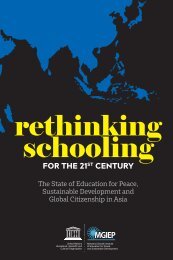Flourishing and Education
This short paper provides a definition of human flourishing, education, learning, teaching and student evaluation, more commonly known as student assessment. These definitions and their relationship with each other set the context of the International Science and Evidence based Education (ISEE) Assessment. The ISEE Assessment, an initiative by the UNESCO Mahatma Gandhi Institute of Education for Peace and Sustainable Development (MGIEP), was designed to provide the science and evidence support to UNESCO’s Futures of Education initiative.
This short paper provides a definition of human flourishing, education, learning, teaching and student evaluation, more commonly known as student assessment. These definitions and their relationship with each other set the context of the International Science and Evidence based Education (ISEE) Assessment. The ISEE Assessment, an initiative by the UNESCO Mahatma Gandhi Institute of Education for Peace and Sustainable Development (MGIEP), was designed to provide the science and evidence support to UNESCO’s Futures of Education initiative.
You also want an ePaper? Increase the reach of your titles
YUMPU automatically turns print PDFs into web optimized ePapers that Google loves.
evaluators (teachers) <strong>and</strong> evaluatees (students). Consequently, teaching, learning <strong>and</strong><br />
evaluation can be considered as educational activities. It is the concept of education that<br />
organises the many ways in which teaching, learning <strong>and</strong> evaluation unfold. Put differently,<br />
the concept of education is constituted by the acts of human relations that in turn give rise to<br />
how teaching, learning, <strong>and</strong> evaluation are organised.<br />
Teaching<br />
When one teaches, one provokes students to come to underst<strong>and</strong>ing. Teaching would not be<br />
teaching if students were not aroused to see the point (Greene, 1995). The point about<br />
teaching is that it implies a relational act according to which students are encouraged to act<br />
in particular ways. And to provoke students implies that they are invited to think for<br />
themselves - a matter of being summoned to come to underst<strong>and</strong>ing. In turn, by provoking<br />
the students, the teacher also learns <strong>and</strong> the students provoke their teachers as well,<br />
stimulating her to learn too (if she is sufficiently open to being provoked).<br />
Learning<br />
Learning happens when students’ potentials are evoked to come to underst<strong>and</strong>ing in agential<br />
ways of being <strong>and</strong> acting (MacIntyre, 1967). Learning would fail to be learning, if students’<br />
potentials are not evoked in the quest to gain underst<strong>and</strong>ing, insight, <strong>and</strong> be encouraged to<br />
embark on academic, political, economic, social <strong>and</strong> environmental activism. In learning,<br />
students act as human agents being intent on coming to make sense of the knowledge they<br />
are taught or read <strong>and</strong>/or the experiences they gain. That is, their learning becomes significant<br />
on the basis of their potentials being evoked to see the point. Now when their potentials are<br />
evoked, they exercise their freedoms to think for themselves <strong>and</strong> to make sense of the world<br />
around them.<br />
Evaluation<br />
Evaluation involves making reasonable judgments about what is taught <strong>and</strong> learned – that is,<br />
as a form of deliberative inquiry, teachers make sense of what students proffered as a<br />
consequence of their learning. Evaluation would not count as evaluation if reasonable<br />
judgments are not proffered about what constitutes teaching <strong>and</strong> learning, <strong>and</strong> if such<br />
judgments are not determined in deliberative action. To evaluate as teachers do, <strong>and</strong> to be<br />
evaluated as students are subjected to, do not happen in isolation but rather, in a way that<br />
both teachers <strong>and</strong> students can justify. When teachers justify their evaluation of students’<br />
work, they give an account of why students produce work of a specific kind - that is, they<br />
provide a justification for their evaluation.<br />
5<br />
Meaning(s) of Human <strong>Flourishing</strong> <strong>and</strong> <strong>Education</strong><br />
A Research Brief by the ISEE Assessment<br />
- An Initiative by UNESCO MGIEP

















